New episode coming soon!
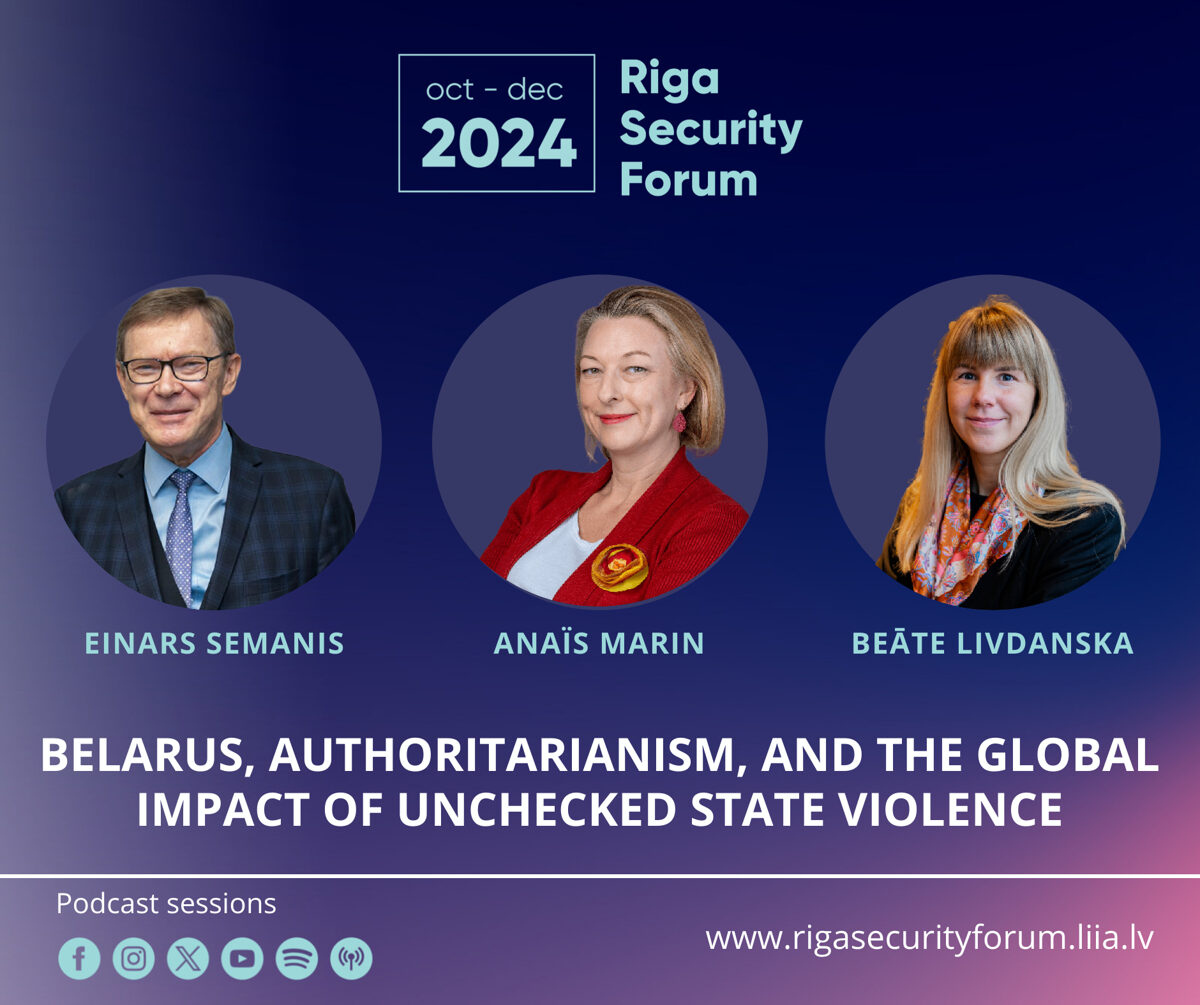
Riga Security Forum 2024 Podcast – New Episode Coming Soon!
Our expert panel includes:
- Anaïs Marin, Associate Fellow, Russia and Eurasia Programme, Chatham House, Former UN Special Rapporteur on Human Rights in Belarus (2018–2024).
- Einars Semanis, Former Ambassador of Latvia to Belarus.
- Beāte Livdanska, Researcher at the Latvian Institute of International Affairs.
7th #RSF2024 episode: Russian disinformation on both sides of the Atlantic

Russian disinformation campaigns are constantly evolving, targeting democracies worldwide with tailored narratives designed to exploit divisions, manipulate public opinion, and erode trust in institutions. While European nations often find themselves on the frontlines of this hybrid warfare, Canada has also emerged as a key target of Russian influence operations.
Join Marcus Kolga, Founder and Director of "DisinfoWatch"; Senior Fellow at the Macdonald-Laurier and CDA institutes, and Martins Hirss, PhD in politics and expert in disinformation, as they delve into the strategies and impacts of Russian disinformation on both sides of the Atlantic.
Available on December 17! Don’t miss it!
Riga Security Forum 2024 in-person event: "Shaping the Future of Defense and Security"
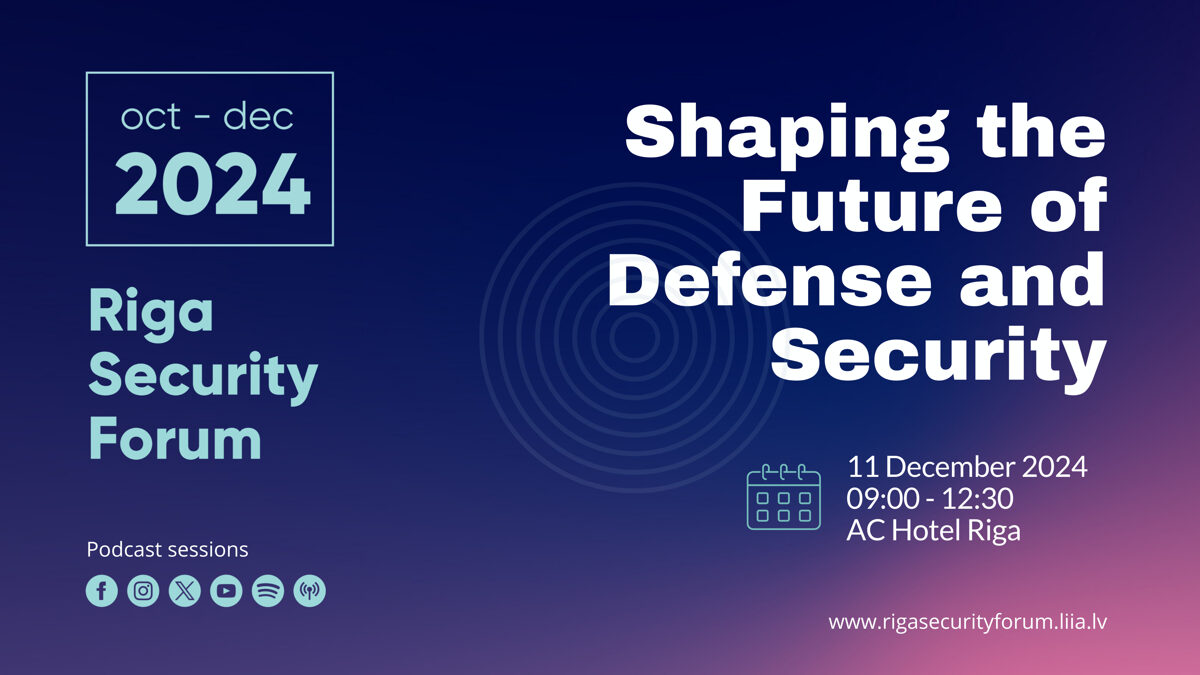
The Latvian Institute of International Affairs invites you to the Riga Security Forum 2024, an in-person event: "Shaping the Future of Defense and Security" set to take place on December 11, 2024, at the AC Hotel Riga, Dzirnavu street 33, 11th floor. This premier gathering will bring together defense and security leaders, experts, and stakeholders to discuss innovative strategies and collaborate on addressing today’s most pressing security challenges.
Working language - English.
Register now to secure your seat.
Agenda Overview
08:30 – Registration
Kickstart the day by connecting with participants and securing your seat for the sessions.
09:00 – Opening Session
- Opening Remarks by Dr. Kārlis Bukovskis, Director at the Latvian Institute of International Affairs.
- Welcome Note from Strategic Partner Ms. Beate Martin, Head of Regional Office for the Baltic States, Friedrich-Ebert-Stiftung.
Keynote Speech:
- H.E. Baiba Braže, Minister of Foreign Affairs of the Republic of Latvia.
09:30 – 10:30: Panel Discussion: “NATO at 75: Reflecting on Two Decades of Latvian Membership and Future Directions”.
An exploration of NATO's legacy, Latvia’s contributions, and the alliance’s future in an increasingly complex global security environment.
11:00 – 12:30: Panel Discussion: “Enhancing Supply Chain Security in the Defense Industry”.
A forward-looking discussion on securing and strengthening supply chain resilience in the defense sector to address vulnerabilities and enhance strategic preparedness.
The Riga Security Forum 2024 provides a unique platform to engage with influential voices shaping defense and security policies both regionally and globally. Attendees will have the opportunity to participate in forward-thinking discussions on NATO’s evolution, Latvia’s pivotal role within the alliance, and groundbreaking innovations in the defense industry.
Stay updated!
The 6th podcast episode will be available on December 3rd!
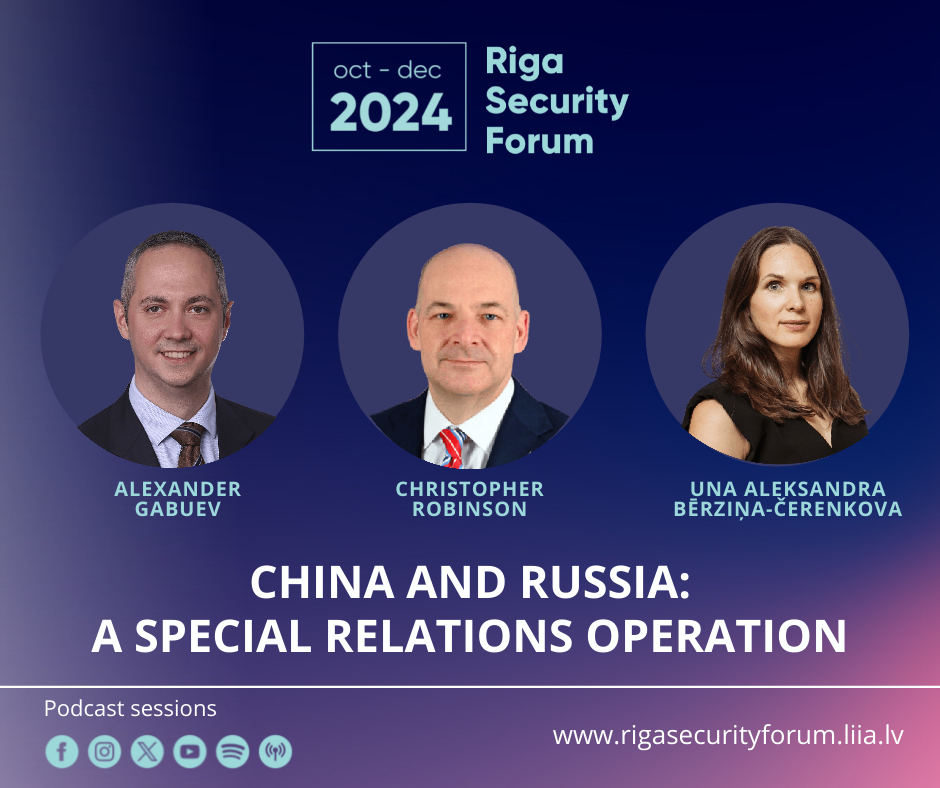
In this episode, we will delve into an exclusive analysis of the strategic partnership between China and Russia, exploring its potential impact on global security and the United States' perspective on these dynamic relations. Sharing their expert insights will be Alexander Gabuev, Director of the Carnegie Russia Eurasia Center, and Christopher Robinson, United States Ambassador to the Republic of Latvia. The discussion will be moderated by Una Aleksandra Bērziņa-Čerenkova, political scientist and Head of the Asia Program at the Latvian Institute of International Affairs.
This episode will offer a unique opportunity to gain a deeper understanding of great power dynamics and their implications for the Baltic region. Don’t miss it – the conversation will go live on December 3rd!
Next episode available on November 26
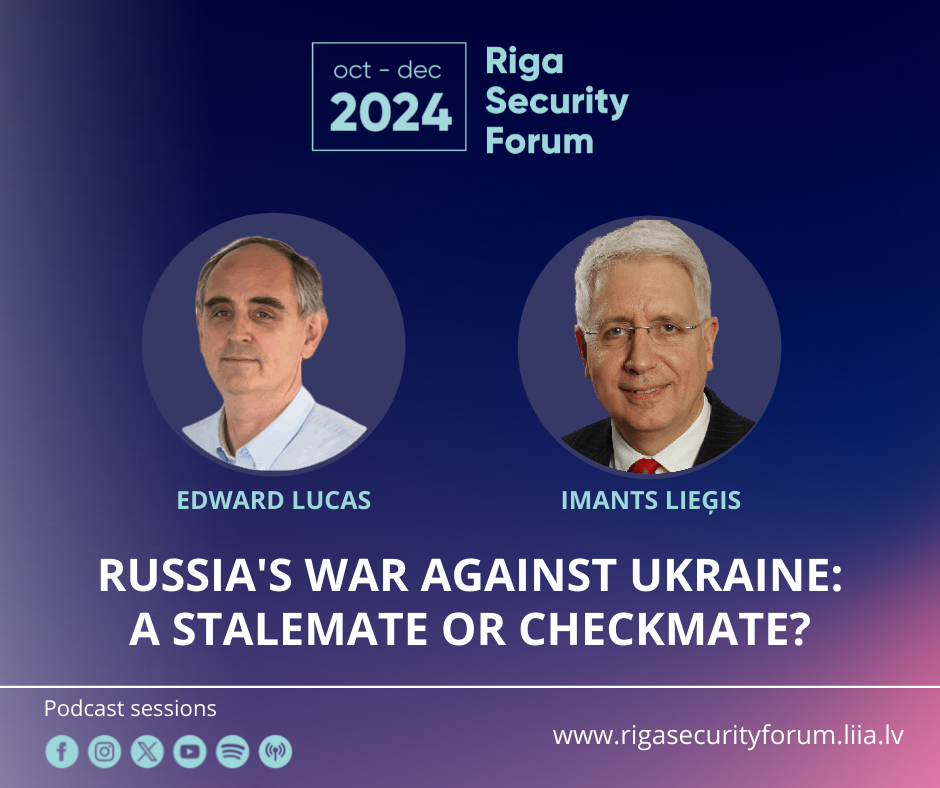
The next #RSF2024 episode: "Russia's War against Ukraine: A Stalemate or Checkmate?" explores the critical dimensions of one of the most significant conflicts in recent history. Moderated by Mr. Imants Lieģis, Head of the Security Programme at the Latvian Institute of International Affairs, and featuring Mr. Edward Lucas, Senior Fellow and Senior Advisor at the Center for European Policy Analysis (CEPA), this discussion delves into the strategic and political aspects of the war. From the military perspectives on the battlefield to the far-reaching impacts on European security architecture and global power balances, this dialogue offers a comprehensive analysis of the stakes involved.
Join us as we unpack the evolving narratives, potential turning points, and paths forward in this defining geopolitical struggle.
The conversation will be available on November 26!
4th Episode: "Narrative Wars: The Power of Media in a Divided World"
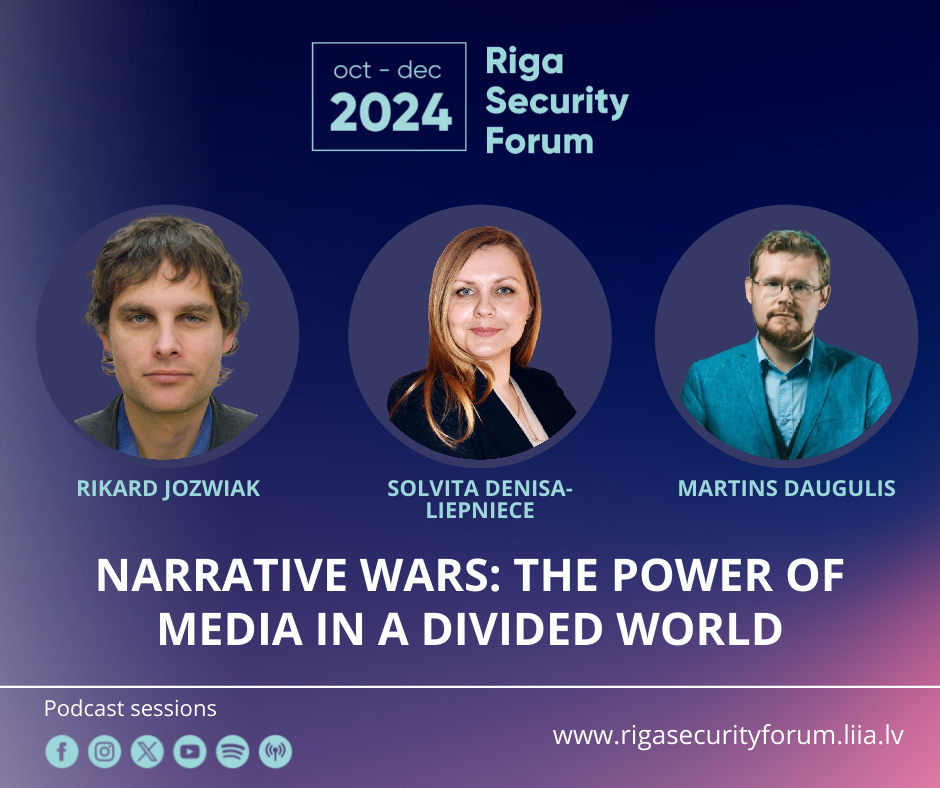
Next #RSF2024 debate: "Narrative Wars: The Power of Media in a Divided World," available on November 20.
With information more accessible than ever, the media landscape has evolved into a battlefield for shaping perceptions and exerting influence. With high-stakes elections and ongoing conflicts, such as the Russia-Ukraine war, the role of media is more critical than ever. Experts will examine the diverse narratives emerging in today's media, exploring how they are constructed and their impact on public opinion, policy decisions, and international relations.
Speakers:
- Solvita Denisa-Liepniece, Assistant Professor at Vidzeme University of Applied Sciences;
- Rikard Jozwiak, Europe Editor for RFE/RL in Prague.
- Moderator: Martins Daugulis, Research and Development Director at the Analytics and Advocacy Group "PowerHouse Latvia".
Don't miss it!
3rd Episode: "The U.S. and the Eastern Border of Western Civilization"
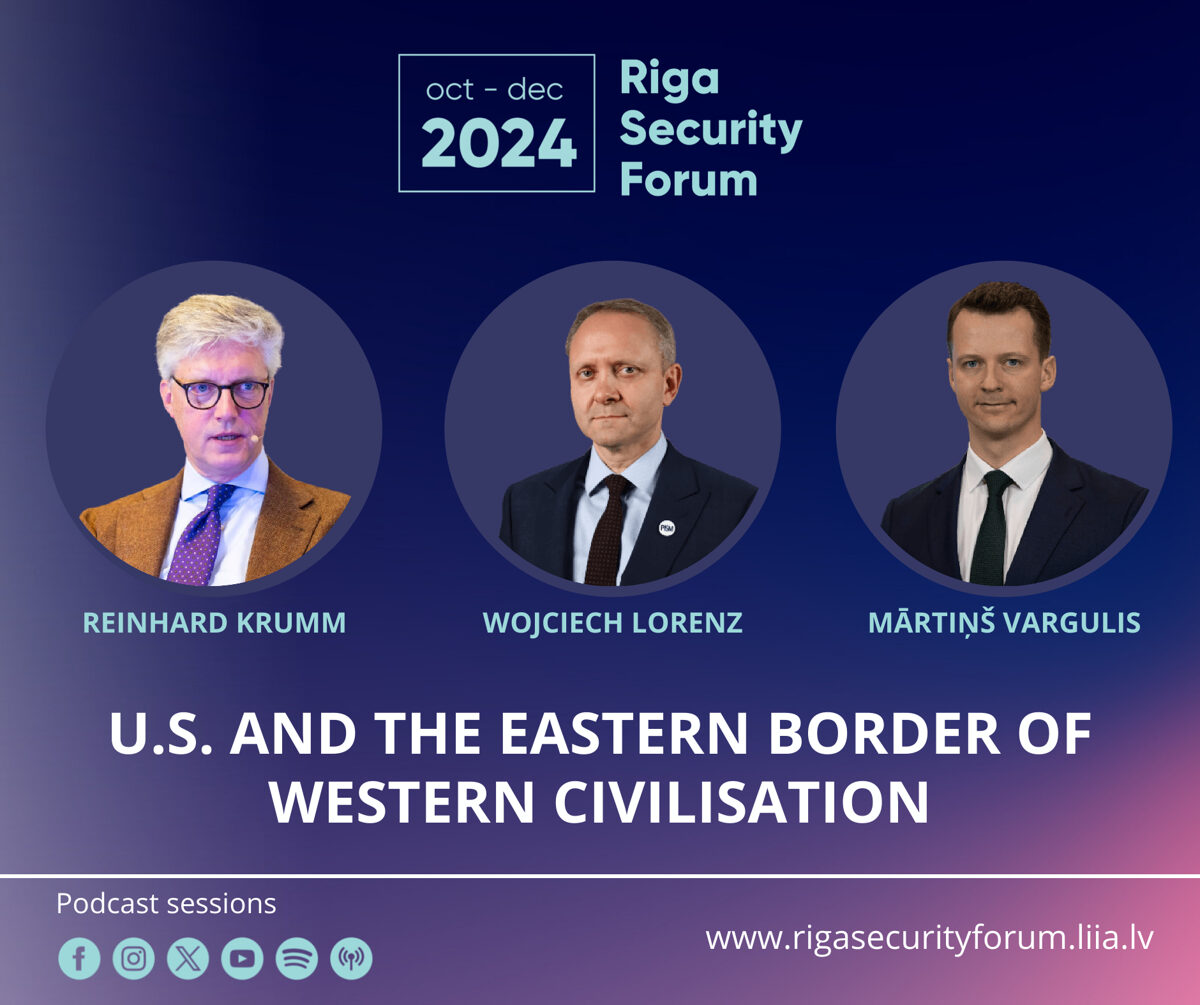
Upcoming Riga Security Forum debate: "The U.S. and the Eastern Border of Western Civilization" – available on November 12. How might the outcomes of the U.S. presidential election impact the security of the Baltic States? Join this insightful debate, where experts will explore potential shifts in U.S. foreign policy, defense funding, and military presence—unpacking what these changes could mean for regional stability and security.
- Reinhard Krumm, Director at the Friedrich-Ebert-Stiftung in the United States and Canada;
- Wojciech Lorenz, Head of the International Security Programme at the Polish Institute of International Affairs;
- Martins Vargulis, Lecturer at the Riga Stradins University and Director at the Analytics and Advocacy Group “PowerHouse Latvia”.
Available on November 12.
2nd Episode: "Global North vs Global South: NATO Partnerships and Beyond"

The second session of the Riga Security Forum podcast, titled "Global North vs Global South: NATO Partnerships and Beyond," delves into NATO's evolving partnerships with its southern neighbors and explores the Alliance’s broader role in addressing global security challenges. This discussion focuses on NATO’s proactive engagement in the Middle East, North Africa, and the Sahel, regions marked by complex security dynamics yet offering vital opportunities for collaboration. Through these partnerships, NATO seeks to promote stability, security, and economic prosperity, addressing common concerns such as terrorism, migration, and resilience in the face of new and traditional threats.
Joining the discussion is Javier Colomina, the Acting Assistant Secretary General for Political Affairs and Security Policy and NATO Secretary General’s Special Representative for the Southern Neighbourhood, who brings in-depth insights into NATO's strategies, priorities, and long-term vision for its partnerships in these regions. Moderated by Māris Andžāns, Director of the Center for Geopolitical Studies Riga. This session promises an engaging analysis of NATO’s role in the Global South and its efforts to build a more secure and interconnected world.
Don’t miss this insightful discussion, available November 5!
1st Episode: "The UN in a Fractured World: Relevance, Reform, and Resilience"

We are excited to launch the Riga Security Forum 2024 podcast series with this inaugural episode, available on October 29 in both video and audio formats. Tune in on YouTube, Spotify, and Apple Podcasts to join an engaging conversation on the pivotal role of the United Nations in addressing global challenges amid rising geopolitical tensions.
This episode will examine the UN's relevance in today’s world, the urgent need for institutional reforms, and how the organization can build resilience against emerging threats like climate change and cyber security. The discussion will also spotlight Latvia’s candidacy for a seat on the UN Security Council (2026-2027), providing insights into how smaller nations can contribute to global diplomacy and stability. Our expert guests will share their perspectives on Latvia's strategies for conflict resolution, upholding international law, and promoting human rights in an increasingly complex global environment.
Participants:
- Andrejs Pildegovičs, Ambassador at Large, UNSC Task Force Director;
- Gunda Reire, Head of the Chancery of the President of Latvia and Director of the Center for International Studies.
Moderator: Uģis Lībietis, Head of the Latvian Radio News Service and Researcher at the Latvian Institute of International Affairs.
Don’t miss this insightful discussion, premiering October 29!
The new season of the Riga Security Forum 2024
8th Riga Security Forum episode: "AI as a Disruptive Technology in the Security Considerations of Europe"
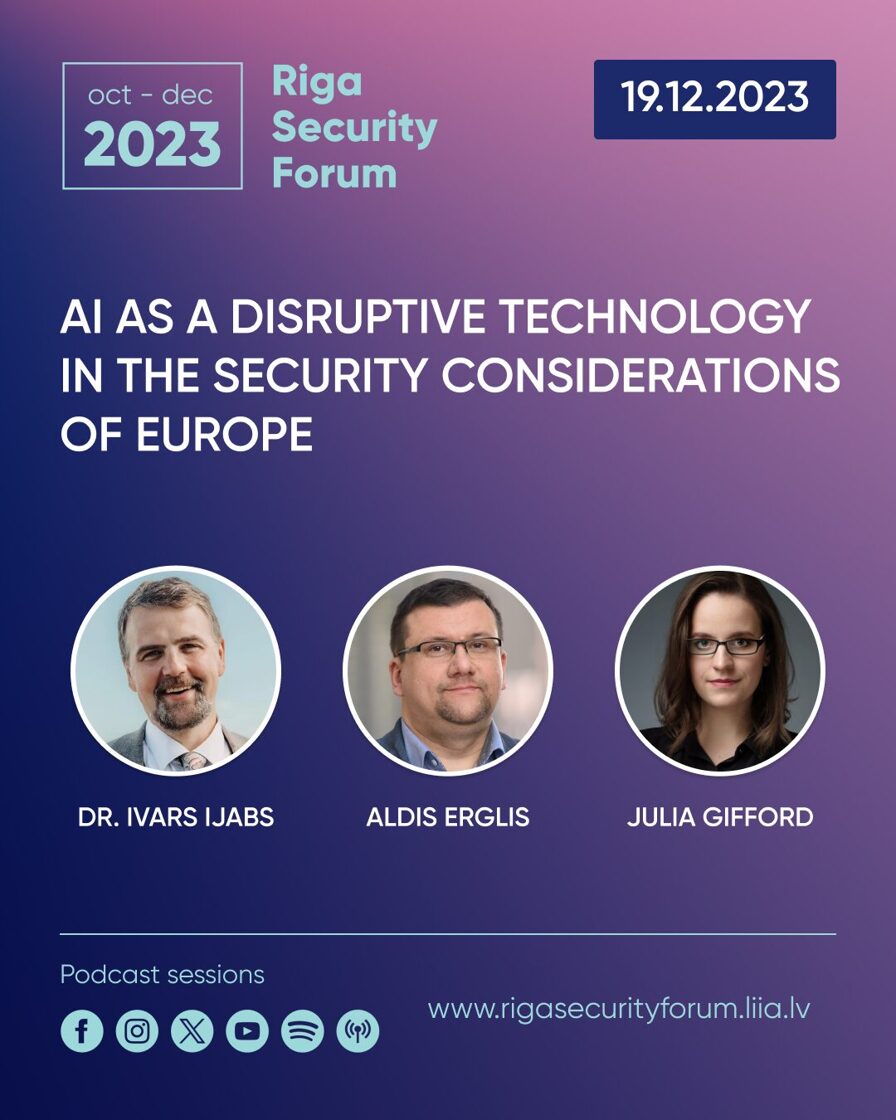
Join us for the upcoming episode of the Riga Security Forum: "AI as a Disruptive Technology in the Security Considerations of Europe".
- Dr. Ivars Ijabs, Member of the European Parliament & political scientist;
- Aldis Erglis, Chairman of Emergn Latvia;
- Julia Gifford, Co-founder of Truesix.
Mark your calendars for this insightful conversation!
7th Riga Security Forum episode: "Global South and the Quest for International Justice"
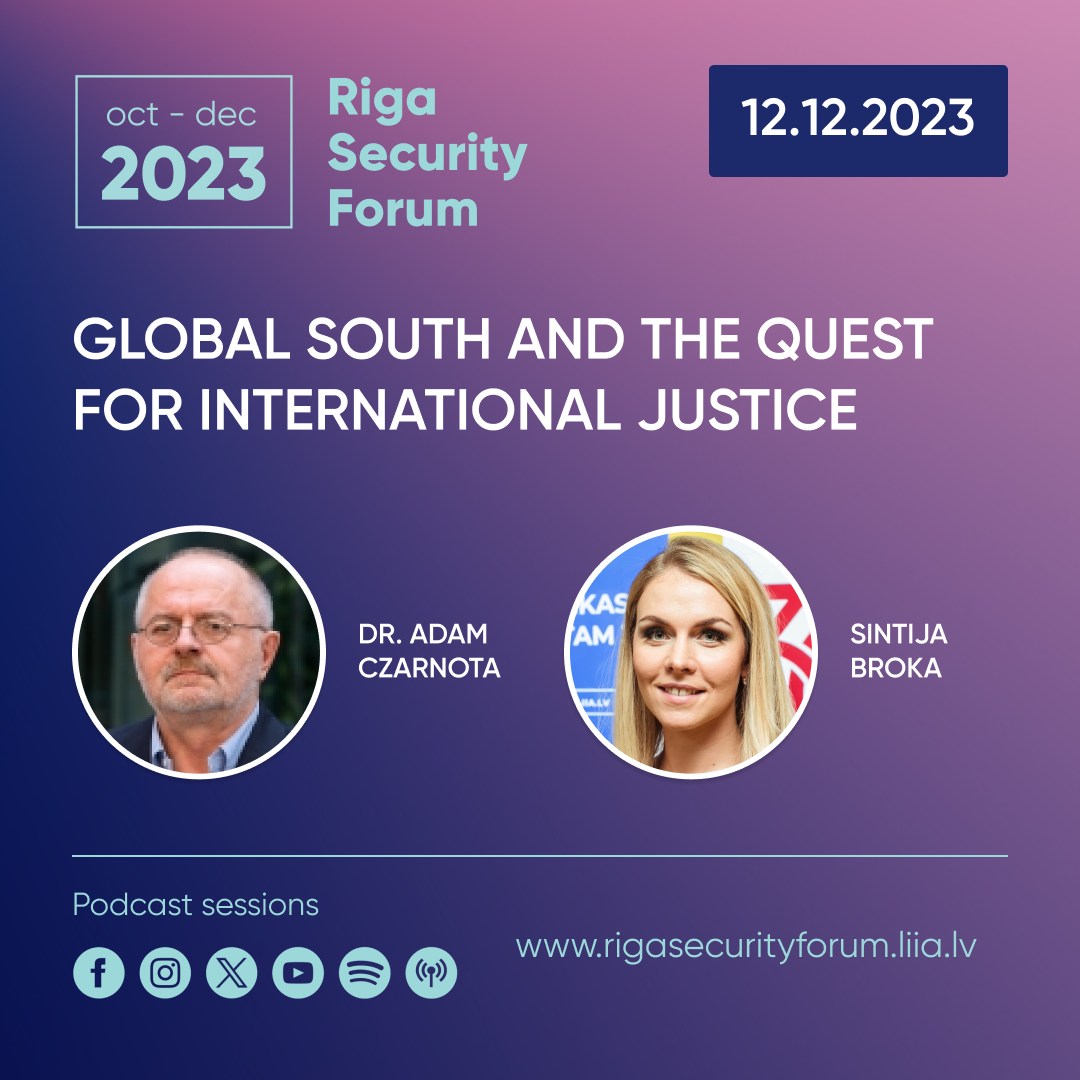
The next Riga Security Forum episode: "Global South and the Quest for International Justice," will be released on Tuesday, December 12!
LIIA Researcher Sintija Broka will talk to Dr. Adam Czarnota, Rector at the Riga Graduate School of Law. This discussion will discuss whether there is a demand for exporting Western values beyond our borders and how far international justice stretches.
Stay tuned for the premiere link!
Riga Security Forum 2023: How European is European security? closing event
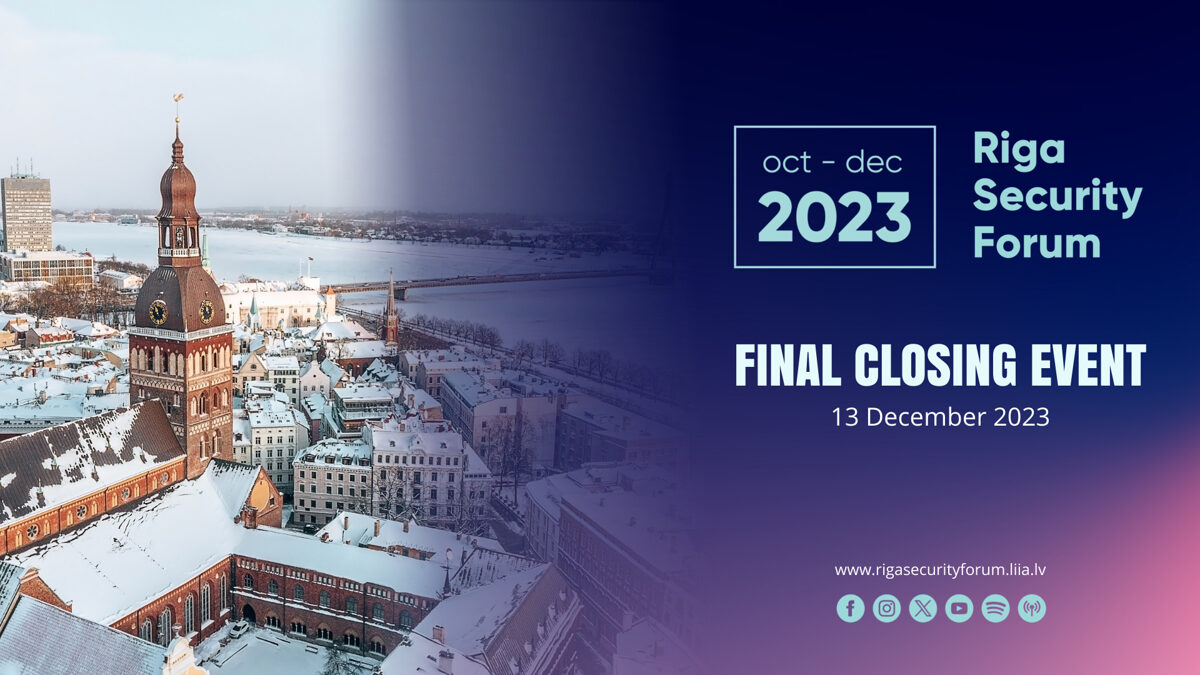
Riga Security Forum 2023: How European is European security? in-person closing event will take place on December 13, 2023, in-person and online!
For the fifth year in a row, the Latvian Institute of International Affairs (LIIA) organizes the Riga Security Forum, bringing together international experts in the spheres of security, politics, technology, education, and defense. In a series of ten fascinating broadcasts, experts will unravel issues of global significance through political self-reflection and, through answers to uncomfortable questions, strengthening mutual understanding in building a safer future.
13 December agenda:
12:00 – 12:40 - Arrival and registration
12:40 – 12:55 - Opening remarks:
- Dr. Kārlis BUKOVSKIS, Director at the LIIA
- Dr. Reinhard KRUMM, Director at FES Baltic states
13:00 – 14:15 - 1st panel: Strategic Partnership Concept from military security, economic and social perspectives
Panelists:
- Mr. Jānis GARISONS, State Secretary of the Ministry of Defence of Latvia;
- Mr. Mats WARSTEDT, Senior Vice President Nordics at Patria;
- Ms. Elīna EGLE, Chairwoman of the Board of the Federation of Security and Defence Industries of Latvia.
Moderator:
- Dr. Artis PABRIKS, Chairman of "Northern Defence Policy Centre" and former Minister for Defence.
14:15-14.45 - Coffee break
14:45-15:30 - 1:1 conversation: The importance of economic growth to security
Discussants:
- H.E. Christopher ROBINSON, U.S. Ambassador in Latvia and Dr. Kārlis BUKOVSKIS, Director of the Latvian Institute of International Affairs.
Event host - Sintija BROKA, Riga Security Forum project manager.
Riga Security Forum aims to gather key international policymakers, industry leaders, as well as military and civilian experts to discuss events, trends, opportunities, and challenges lying ahead for the international community. From October till the end of December, we will discuss both "conventional" and "unconventional" security challenges.
All the episodes are gradually available at www.rigasecurityforum.liia.lv or at Spotify or Apple Podcast "Riga Security Forum 2023" accounts.
6th Riga Security Forum discussion: "EU’s Global Outlook and Southern Neighborhood"
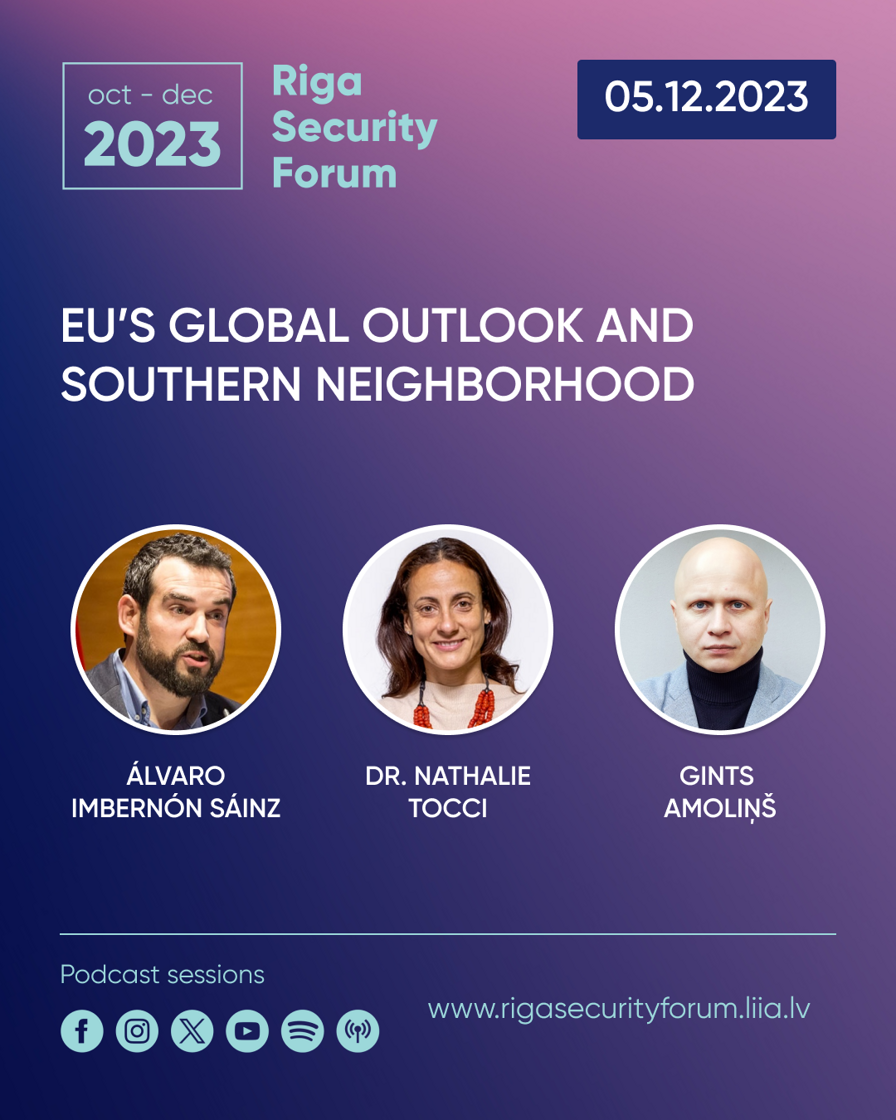
We are looking forward to the sixth episode of the Riga Security Forum, which will be released on Tuesday, December 5, and will gather distinguished guests!
Participants:
- Álvaro Imbernón Sáinz, Director of Strategy and Foresight in the Ministry of Foreign Affairs, European Union and Cooperation of Spain;
- Dr. Nathalie Tocci, Director of the Istituto Affari Internazionali & Professor at the School of Transnational Governance;
- The conversation will be moderated by Gints Amoliņš, Foreign news correspondent at Latvian Television.
This discussion will look at the EU's strategic approach to fostering stability, security, and prosperity in its Southern Neighborhood region.
Why is this important?
The President of the European Commission's speech on the situation in the European Union in 2023 highlighted the need to restore relations between the European Union and African countries. Due to migratory pressures, geopolitical changes and the importance of raw material supply chains, Europe's southern neighborhood will become increasingly important.
Stay tuned for the premiere link!
5th Riga Security Forum discussion: “Turkey vs. Ukraine – Who is more important to the EU?”
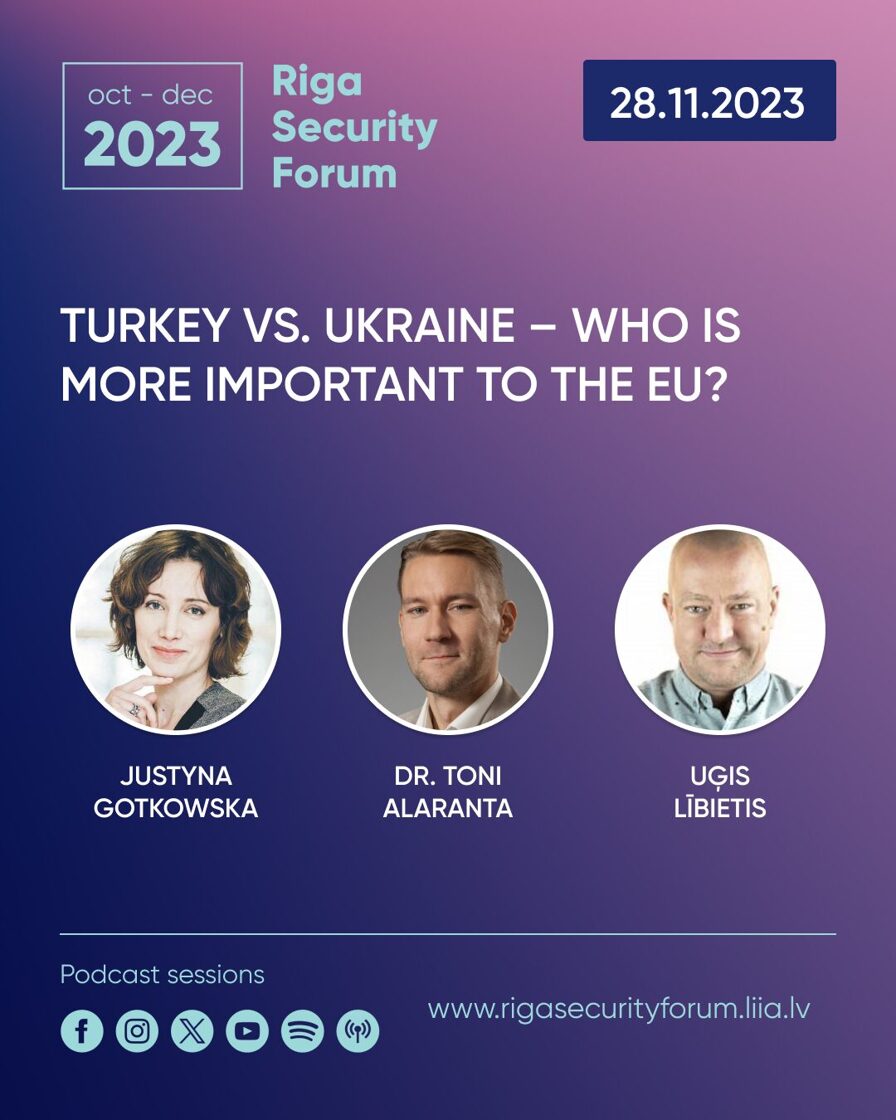
We are half way through! Join us for the 5th Riga Security Forum discussion, premiering on Tuesday, November 28!
Featuring distinguished experts:
- Dr. Toni Alaranta, Senior Research Fellow at the Finnish Institute of International Affairs;
- Justyna Gotkowska, Deputy Director Centre for Eastern Studies (OSW);
- Moderated by Uģis Lībietis, Associate Researcher at the Latvian Institute of International Affairs.
This discussion, in an unorthodox and bold manner, will explore the strategic significance of both Turkey and Ukraine in the context of the EU and the geopolitical implications of both countries.
Stay tuned for the premiere link!
4th Riga Security Forum discussion: Nuclear arsenal and China
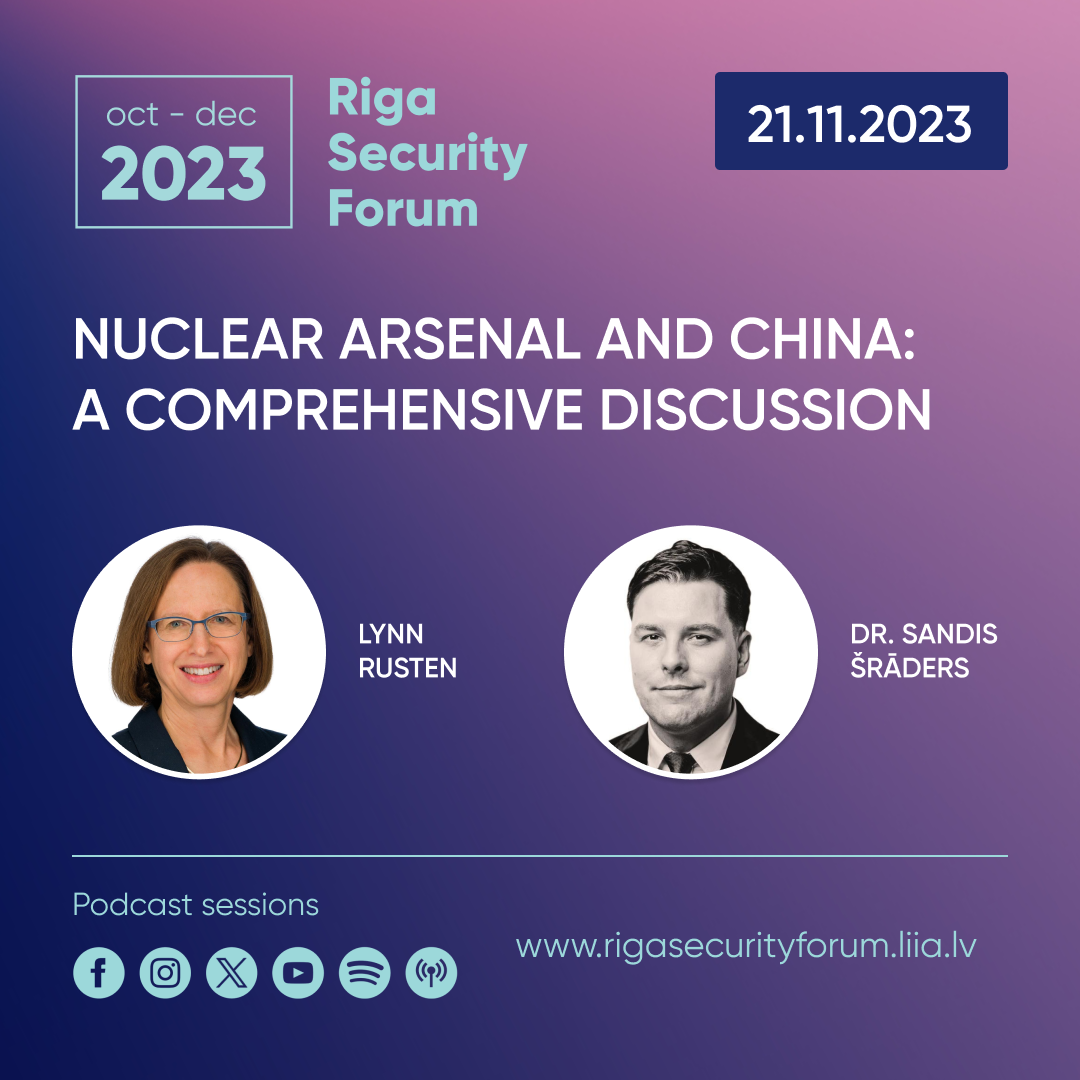
Join us for our 4th Riga Security Forum discussion, premiering on Tuesday, November 21!
Featuring distinguished experts: Lynn Rusten, Vice president for Nuclear Threat Initiative Global Nuclear Policy Program and Dr. Sandis Šrāders, Researcher and Lecturer at the Baltic Defence College.
This discussion will delve into the multifaceted issues surrounding China's nuclear weapons program and its implications on global security and diplomacy. Experts will explore China's strategic intentions, regional and international implications.
Stay tuned for the premiere link!
3rd Riga Security Forum discussion: "The alliance of sanctioned nations: impact and implications".
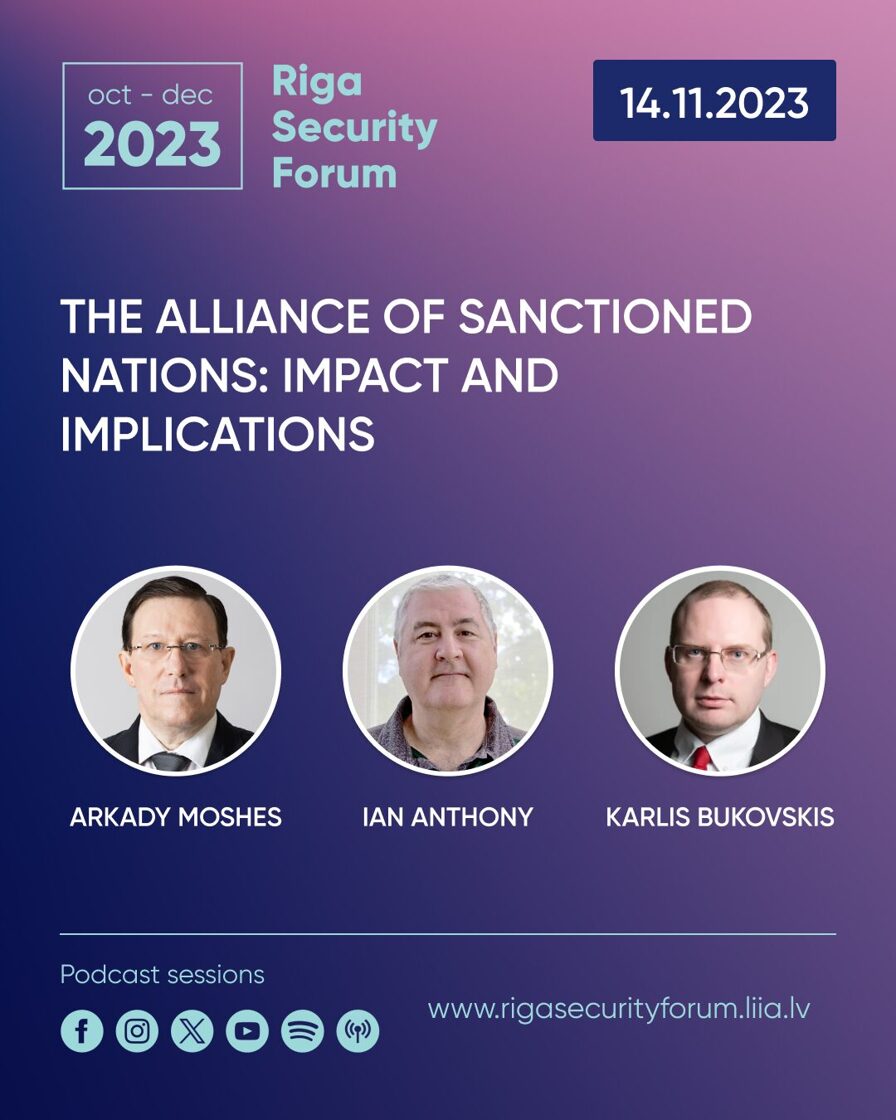
Join us for our third Riga Security Forum discussion, premiering on Tuesday, November 14th! Topic: "The alliance of sanctioned nations: impact and implications".
Featuring distinguished experts:
- Dr. Arkady Moshes, Programme Director at the Finnish Institute of International Affairs;
- Dr. Ian Anthony, Research Analyst at the Swedish Defence Research Agency (FOI);
- The discussion will be moderated by Dr. Karlis Bukovskis.
This discussion will focus on the concept of a "Coalition of the Sanctioned" – the countries that have been put under sanctions list by the European Union and the United States and who are seeking to collaborate among themselves. Countries like Iran and North Korea seem to be looking for a partnership with Russia. Hence, the goal of the discussion is to investigate how successful and strong these partnerships among the countries of the "coalition of the sanctioned" could become.
Stay tuned for the premiere link!
2nd Riga Security Forum episode "The U.S. cannot afford to protect the EU. Why does the Eu need protection?"
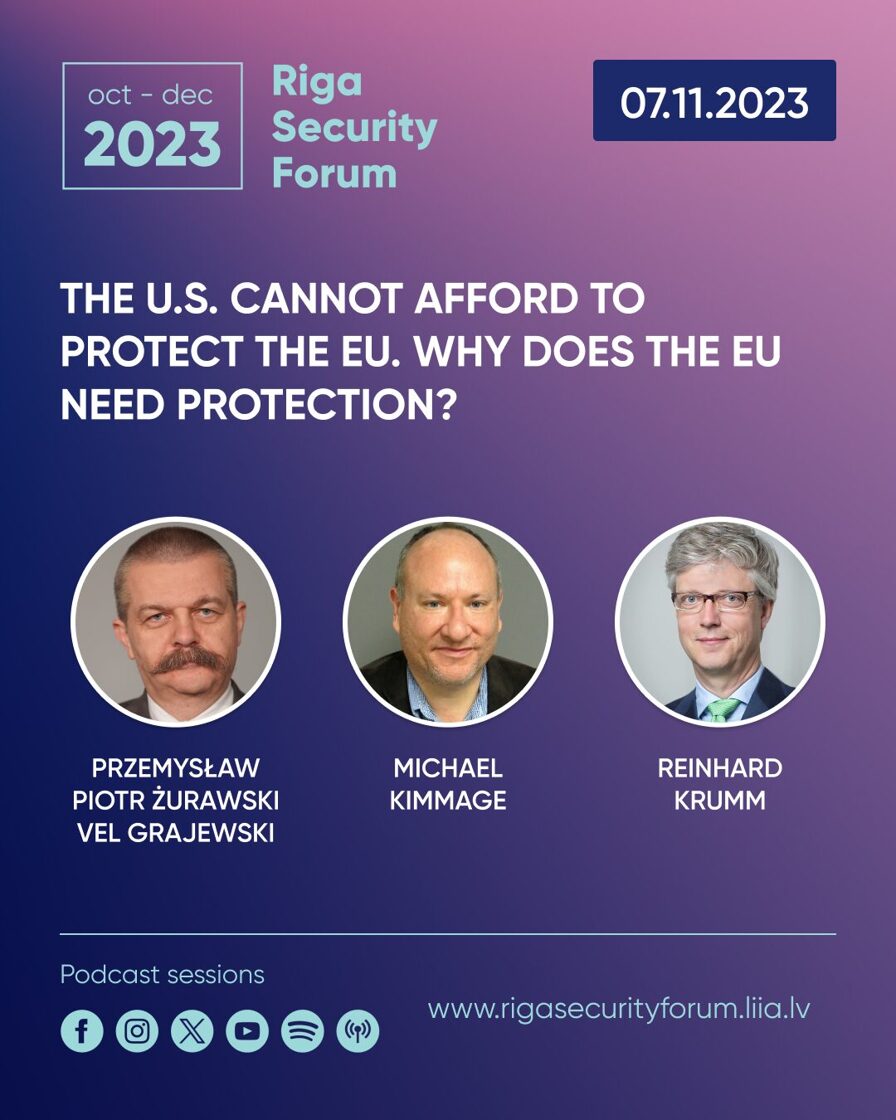
2nd Riga Security Forum episode "The U.S. cannot afford to protect the EU. Why does the Eu need protection?", premiering on Tuesday, November 7th.
Panelists:
- Prof. Przemysław Żurawski vel Grajewski, Political Scientist at the University of Łódź;
- Prof. Michael Kimmage, Ordinary Professor and Department Chair at The Catholic University of America;
- Dr. Reinhard Krumm, Director of the Friedrich-Ebert-Stiftung (FES) in the Baltic States.
Watch the discussion online on Tuesday!
Opening high-level conversation with president of Latvia, H.E. Edgars Rinkēvičs
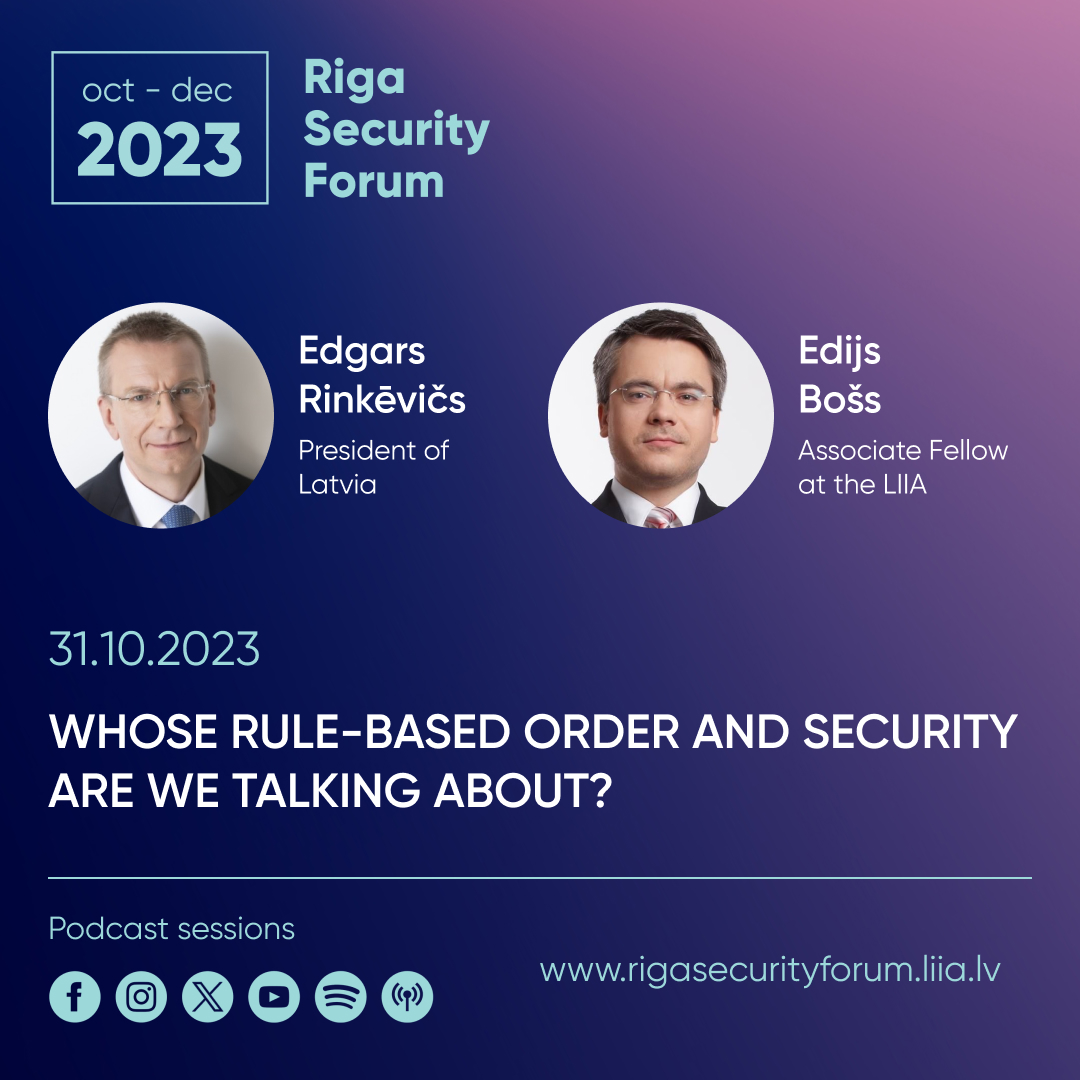
On Tuesday, October 31, we will open the Riga Security Forum with a high-level conversation in which Edijs Bošs will talk with the president of Latvia, H.E. Edgars Rinkēvičs!
In the discussion, we will analyze the causes of international tension, possible development scenarios, and how Latvia can navigate this confusion, avoid getting lost, and stay on course.
Podcast sessions in Latvian and English will be available every Tuesday on the project's website, LIIA's social media accounts, as well as streaming platforms such as "Spotify" and "Apple."
Proud to introduce the elegant "Security Crown"

The Riga Security Forum begins next Tuesday, October 31, online.
We're proud to introduce the elegant "Security Crown," designed by the talented Brigita Stroda (Crown Heads of Europe) who wisely reminds us that "Security starts in our head."
Join us for this important event, where experts and thought leaders will discuss the future of our security!